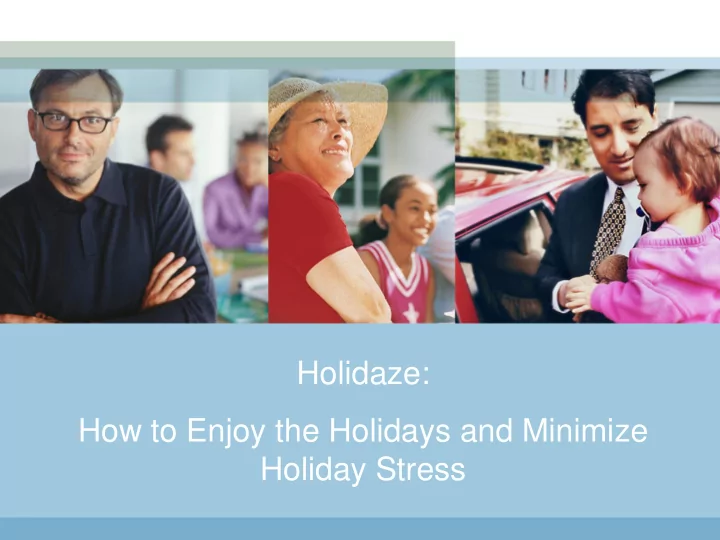

Holidaze: How to Enjoy the Holidays and Minimize Holiday Stress
Presenter Caroline May, MBA, MSN Caroline May earned her MBA from the University of Akron and in 2013 earned her Master's of Science in Nutrition from Meredith College. She currently works as a Certified Health Coach. Prior to that she worked for the Nutrition Department at UNC Hospital in the neonatal intensive care unit (NICU) mixing formula and fortifying breast milk. Before that she was the Documentation Department Head for a start up tax software development company. She enjoys being a busy mom of four for the last 15 years and will be celebrating her 29 th wedding anniversary next year. She always has and continues to respect health and wellness as a top priority for the individual as it sustains and strengthens the group.
Learning Objectives • Identify the sources of holiday stress • Provide tips for managing the holidays • Learn ways to make this “your holiday”
Did You Know? According to the American Psychological Association, 61% of people experience stress during the holiday season, while 68% experience fatigue.
Leading Cause of Stress Financial issues remain the leading cause of stress, as people are concerned with how to pull off a successful holiday season given their financial constraints.
Other Effects Other negative effects experienced during the holiday season include • Irritability – 52% • Bloating – 28% • Sadness – 36% • Anger – 35% • Loneliness – 26%
Survey Around the holiday season, people are more inclined to feel an increase in their stress level versus a decrease (38% increase versus 8% decrease). An increase is reported by 44% of women versus 31% of men. Where do you find most of your holiday stress comes from? A. Myself B. Family C. Friends D. Work E. Finances
Sources of Holiday Stress • Internal • External
Internal Sources of Holiday Stress • Unrealistic expectations • Time of “ghosts from holidays past” • Catalyst for unfinished emotional business • Celebration anxiety
External Sources of Holiday Stress • High demand on already hectic schedules • Dispersed families • Changed family situations
Identify Stressors The TARP method • Tune In • Analyze • Respond • Prevent
Tune In Follow these four steps: 1. Look for physical signs of stress. 2. Examine your behavior for signs of stress. 3. Think about your emotions. 4. Scan your thoughts and your patterns of thinking.
Analyze After identifying which of the four areas are targets for stress, examine ways to combat the stressors.
Respond • Stop and breathe. • Practice progressive muscle relaxation. • Use thought-stopping techniques.
Prevent • Exercise. • Eat right. • Avoid excess alcohol and smoking, if applicable.
Managing Your Expectations Look at the discrepancy between your expectations and your reality. • Look at the source of your expectations. • Acknowledge the limitations of your situation. • Adjust your plans, and be realistic. • Be honest about your feelings.
Survey My expectations for the holidays match what actually happens: A. Most of the time B. Some of the time C. Not very often
Preventing Holiday Stress ASK YOURSELF: Are my expectations for the holiday season realistic? • Create a list of what you expect from both yourself and your family. • For each item, jot down the changes that you can make to prevent or defuse stress.
Managing the Holidays Own your holiday traditions. • Importance of traditions • Criteria to keep traditions • Criteria to drop traditions • Change existing traditions • Create new traditions
Managing the Holidays (continued) Use organizational and time management techniques to prevent exhaustion, disappointment, and burnout. • Plan ahead. • Delegate and share the load. • Organize. • Consider finances – Reduce spending – Stick to a budget
What Do I Want My Experience to Be? • What do I want – my vision? • How does it match my reality? • How will it affect others? • How much time is involved? • What will I do differently? • What will I give up?
Survival Techniques • Have a balance of autonomy and connectedness. • Maintain a positive attitude. • Be mindful of your need for sleep, nutrition, exercise, and downtime. • Anticipate family dynamics at gatherings with relatives. • Stay focused on the meaning and importance of the time.
For More Information or Assistance Contact Your Employee Assistance Program (EAP) or Work-Life Program
Thank You Questions?
Works Cited Cleveland Clinic Foundation. (Reviewed 2016, March 1). Managing holiday stress . Retrieved October 18, 2016, from http://my.clevelandclinic.org/health/healthy_living/ hic_Stress_Management_and_Emotional_Health/hic_Managing_Holiday_Stress Greenberg Quinlan Rosner. (2006, October 24). Holiday stress . Retrieved October 18, 2016, from https://www.apa.org/news/press/releases/2006/12/holiday-stress.pdf Stoppler, M. C. (Reviewed 2016, May 12). Holiday depression and stress . Retrieved October 18, 2016, from http://www.medicinenet.com/holiday_depression_and_stress/article.htm
Recommend
More recommend